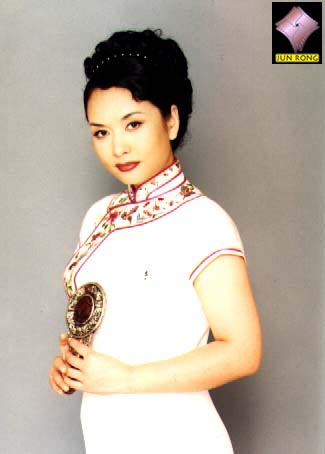- Peng Liyuan
Infobox musical artist 2
Name = Peng Liyuan
Img_capt= Peng Liyuan inqipao
Background =
Birth_name =
Born = birth date and age|1962|11|20
Origin = flagicon|China Juncheng,Shandong
Instrument =
Genre = Chinese Folk,opera
Occupation =Singer
Years_active = 1982–present
Spouse =Xi Jinping
Label =
Associated_acts =
Influences =
URL = [http://ent.sina.com.cn/s/m/f/pengly/index.html Peng Liyuan's homepage]
Notable_instruments =Peng Liyuan (zh-c|c=linktext|彭|丽|媛,
Pinyin : Péng Lìyuán; born onNovember 20 ,1962 ) is one of the top Chinesefolk music singers, and a performer popularized by her regular appearances on the annualCCTV New Year's Gala , a widely viewed Chinese television program duringChinese New Year . She has obtained many honors in singing competitions nationwide.Her most famous works include "People from our Village" (父老乡亲), "Mount Everest" (珠穆朗玛) and "On the Plains of Hope" (在希望的田野上). Peng Liyuan is a member of China's
People's Liberation Army and currently has the rank ofmajor general . She was one of the first in China to obtain a Master's degree in traditional ethnic music when the degree was first established in the 1980s. She is married to Chinese Vice-PresidentXi Jinping .Biography
Peng Liyuan is a native of Juncheng County, now part of
Heze ,Shandong . Peng joined thePeople's Liberation Army after the downfall of theGang of Four in 1980, when she was 18. She began as an ordinary soldier, although eventually with her vocal talent she began performing at PLA performances to boost troop morale. [cite web|url=http://www.ce.cn/xwzx/ylxk/dl/200407/01/t20040701_1165155.shtml |publisher = CE.cn| title= Peng Liyuan describes her own time in the army| date=2004-07-01| accessdate=2008-05-28| language=Chinese] Peng first performed nationally and came to fame during the earliest rendition of theCCTV New Year's Gala in 1982, when she performed "On the Plains of Hope".She has been married to Chinese Vice-President
Xi Jinping , for over 20 years, they have a daughter named Xi Mingze (习明泽) born in 1992, nicknamed as Xiao Muzi (小木子). For the most part of their relationship Peng has been considerably more known to the public than her political husband.Xi and Peng were introduced by friends like many Chinese couples of the 1980s. Xi was reputedly academic during their courtship, inquiring about ethnic Chinese music. Xi was the son of famous Chinese revolutionary
Xi Zhongxun , and the family did not accept the relationship with ease. The general feelings at the time was that higher official's children were corrupt and arrogant. Xi, however, was reputedly modest and low-profile. After parental consent, the couple married on September 1, 1987 inXiamen ,Fujian . Four days later, Peng Liyuan had to return toBeijing to appear on the national art festival and then immediately left for theUnited States andCanada to perform. Since then they have led largely separate lives, with Peng spending most of her time in Beijing and her husband in Fujian and later Zhejiang.Peng has performed at almost every
CCTV New Year's Gala since its inception, with a notable exception in 2008, after her husband's promotion. Her songs are focused on ethnic or rural Chinese themes and generally deal with a wide range of emotions expressed by ordinary rural citizens. In 2005, her musicalopera "Mu Lang poems" earned her an "Outstanding Artist" from theLincoln Center for the Performing Arts in the United States.fact|date=July 2008Peng is actively involved in politics herself, and is a member of the 11th National Committee of the
Chinese People's Political Consultative Conference .References
External links
*zh [http://ent.sina.com.cn/s/m/f/pengly/index.html Peng Liyuan's homepage] at
Sina.com
Wikimedia Foundation. 2010.
